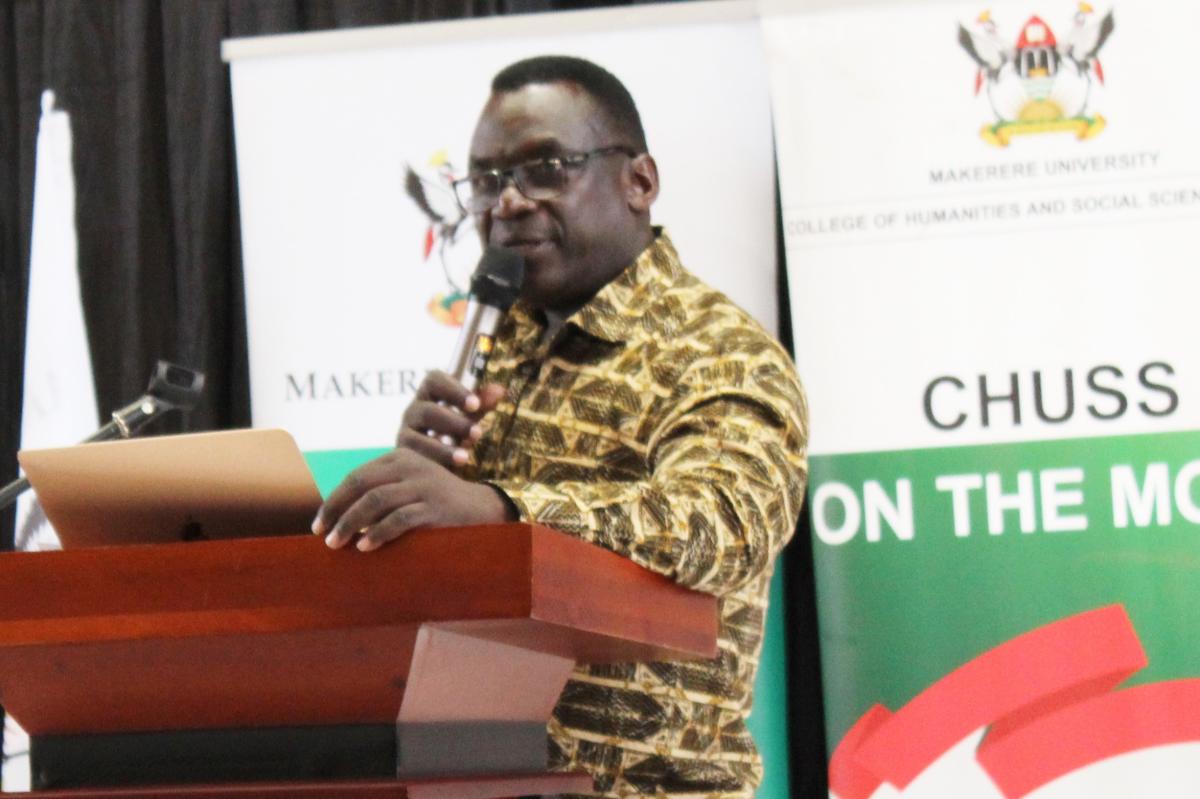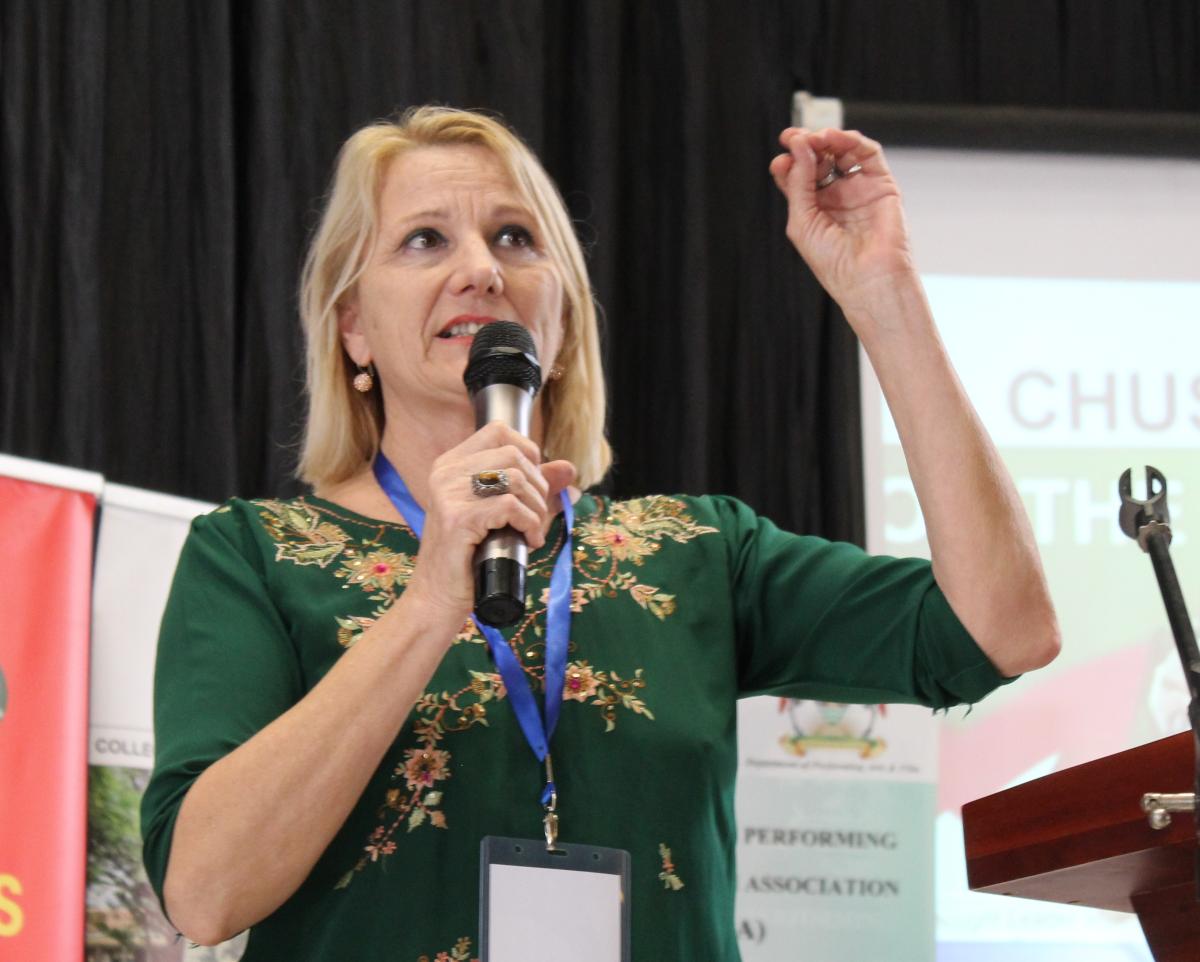
The International Conference on Performing Arts and the Department of Performing Arts Golden jubilee celebrations have officially been opened at Makerere University. The celebrations organised under the theme, Performing Arts and the University of the 21st Century: Concepts, Training and Practice was organised and hosted by Makerere University Department of Performing Arts and Film in partnership with the International Drama/ Theatre and Education Association (IDEA) and Rostock University of Music and Theatre in Rostock Germany.
The one-week event (27th March -1st April 2023) attracted over 400 participants from within Uganda and beyond Africa including Europe, USA, Latin America, Australia, New Zealand, Canada and Asia. The participants comprised teachers, researchers, practitioners and other experts and students in disciplines in performing arts presenting, debating and workshopping knowledge and practice.
This platform created space for faculty to hear and share voices, experiences and dreams and commitments around the world in respect of the field of Theatre and performers, while students were able to interact and learn through paper, panel, key note presentations and get exposure.
Opening the conference on behalf of the university Management, the Dean School of Performing arts Associate Professor Patrick Mangeni explained that the celebration was in recognition of the contribution that the department has made to the field of culture and performance in the last 50 years.

The department started its journey under the department of Literature before it became the Department of Music, Dance and Drama and now the Department of Performing Arts and Film. One of the objectives was to develop the human capacity to contribute to education and development through the arts and the area of arts.
Looking back and counting the fruits of the department’s engagements and production, Prof. Mangeni enumerated a number of key milestones worth celebrating.
Among them includes legends like the Late prof. Rose Mbowa, Prof. Sserwadda’s contribution to dance, Zadok Adolu, Prof. George William Kakoma, Prof. Katana, Prof. Tamusuza who were initially students but also came to serve in the department and contributed to expanding the musical score of Uganda.
Members of the department he said have contributed immensely, for example Prof. George William Kakoma who was also head of department and composed the Uganda National anthem, Rose Mbowa wrote the lyrics for the women’s anthem and the music sung by Prof. R Tamusuza. Others are Prof. Grace Wilson Mutekanga Igaga who composed the current Makerere University Anthem.
“Through Uganda’s history particularity when the department had started, we have made a contribution in terms of sensitisation of communities, and in terms of trying to enforce and enhance unity and collaboration which is key for the development of this country.
The department has also gone in the area of health where it played a significant role in awareness creation and sensitisation around HIV/AIDs but also using theatre as a frame to foster society through particular films”, Mangeni said
In addition, the department has contributed the manpower outside Makerere university that continues to make significant contribution. For example, in scene of Theatre and Comedy, people who started and popularised comedy like Philip Luswata were nurtured by the department, formed the first comedy group and others have moved on and the scene is significantly different and improved.
The department has also added to the human resource management and leadership running the university where members have key roles in different units. Prof. Mangeni has served for seven years as chair ceremonies committee, one of the longest serving chairs and Prof. Nakimera Tamusuza now heading the Grants Administration and Management Unit.
The department has also been critical in the entertainment and cultural life in the university during graduations and all occasions with students active in areas of theatre and development.
“We have a lot to celebrate and above all to acknowledge the university for what it has made us and also to point out clearly what we have contributed to this country and to posture to the future”, Prof. Mangeni added.
The Head Department of Performing Arts and Film, Dr. Benon Kigozi said the conference is part of the events lined up for the commemoration of the 50 years of the Department of Performing Arts and Film.

Dr. Kigozi explained that the conference resonates very well with the IDEA conference held bi-annually in different countries and that is why they we thought of partnering since it was coming to Uganda.
The conference is about research, performance, academics presenting papers coming out of research but we are celebrating 50 years of existence as a department
We want to bring the community into the classroom, see where we can mitigate the challenges, where we are going and what we can put across to other people that are coming up, what has gone wrong, what we ca can correct and good practices are we going to take on board”. Dr. Kigozi explained.
As a department, Kigozi noted, they have come a long way to become vibrant at Makerere university running up to about 12 programmes, from diploma, bachelor of Arts, music, dance and drama then Master of Arts in Performing Arts and also have a doctorate of performing arts.
“We take centre stage in the events of the university to do outreach and entertain, to showcase Makerere and get young ones get on stage before they leave Makerere. Theses alludes to the fact that we are relevant, doing what we must be doing and we are in the right direction”, The head said and demystified the thinking that performing arts has no future.
“There is a lot of future in performing arts. There are so many career benefits and career opportunities that you can take on as a performing artist depending on depending on area you choose. You can choose to be drama, music, theatre, be dance and do film as well.
About 20years ago, most of the things we used to see on TV were foreign but now about 90% of what you see on television is locally made and those students are trained here in this country. The arts are very strong and there so many things we can do as performing artists in terms of changing society , lobbying an in terms of sensitising people on various aspects of life”. He added.
IDEA president Sanja Krsmanovic Tasic said IDEA was last on the African continent in 1998 at the Kisumu congress in Kenya.

After 25 years, she observed people live in completely different world with technological experience expressing happiness that people from all round the world sitting in offices, living rooms, kitchens and watching the conference at Makerere.
“We cannot even know what profession our children will be having and the work they will be doing.So the research that need to be conducted is to prove how much performing arts trains young individuals for the jobs for the new century before us.
We know that drama in teacher education is a very important tool for developing creativity, problem solving for the wellbeing of people especially in post COVID era”, she asserted.
She described the moment as an exciting one following IDEA Congress that was hosted in Island last year, a planned Arts Education summit in Portugal and now at Makerere and next the next IDEA congress meeting scheduled to take place in Beijing China
This proves how IDEA is a world-wide inclusive association that spreads the goodness of drama theatre education. It is not about preaching to the congress, it is Abou finding out who we and how important the field is”, Sanja stressed.
She implored participants to think of how they can change the world as individuals as long as they are alive. In such a meeting she said, there are three most important things to achieve.
One key thing is to listen to each other and find about each other’s work. The second level is to watch each other’s work, (is it a presentation, a performance, a video) but the third level is to work together and encounter each other in creative work.
The conference papers and workshops addressed topics on different themes including Theories and Aesthetics, Text and Performance, Practice and Context, Interculturality and Globalisation and Performing arts and university education.
Other themes were Institutionalisation, Curriculum and Scholarship, Publishing the Performing Arts, Knowledge Production and Reproducibility, Performing Artist for Tomorrow and Digitalisation and New Media.
